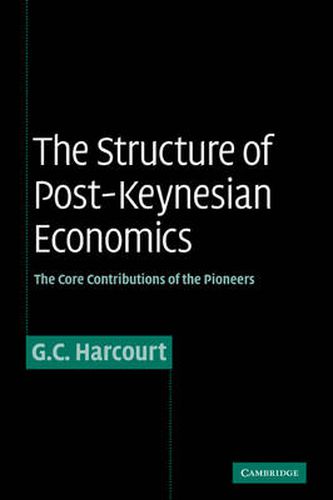Readings Newsletter
Become a Readings Member to make your shopping experience even easier.
Sign in or sign up for free!
You’re not far away from qualifying for FREE standard shipping within Australia
You’ve qualified for FREE standard shipping within Australia
The cart is loading…






This is a major contribution to post-Keynesian thought. With studies of the key pioneers - Keynes himself, Kalecki, Kahn, Goodwin, Kaldor, Joan Robinson, Sraffa and Pasinetti - G. C. Harcourt emphasizes their positive contributions to theories of distribution, pricing, accumulation, endogenous money and growth. The propositions of earlier chapters are brought together in an integrated narrative and interpretation of the major episodes in advanced capitalist economics in the post-war period, leading to a discussion of the relevance of post-Keynesian ideas to both our understanding of economics and to policy-making. The appendices include biographical sketches of the pioneers and analysis of the conceptual core of their discontent with orthodox theories. Drawing on the author’s experience of teaching and researching over fifty years, this book will appeal to undergraduate and graduate students interested in alternative approaches to theoretical, applied and policy issues in economics, as well as to teachers and researchers in economics.
$9.00 standard shipping within Australia
FREE standard shipping within Australia for orders over $100.00
Express & International shipping calculated at checkout
This is a major contribution to post-Keynesian thought. With studies of the key pioneers - Keynes himself, Kalecki, Kahn, Goodwin, Kaldor, Joan Robinson, Sraffa and Pasinetti - G. C. Harcourt emphasizes their positive contributions to theories of distribution, pricing, accumulation, endogenous money and growth. The propositions of earlier chapters are brought together in an integrated narrative and interpretation of the major episodes in advanced capitalist economics in the post-war period, leading to a discussion of the relevance of post-Keynesian ideas to both our understanding of economics and to policy-making. The appendices include biographical sketches of the pioneers and analysis of the conceptual core of their discontent with orthodox theories. Drawing on the author’s experience of teaching and researching over fifty years, this book will appeal to undergraduate and graduate students interested in alternative approaches to theoretical, applied and policy issues in economics, as well as to teachers and researchers in economics.